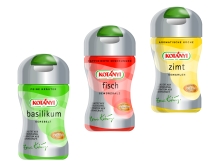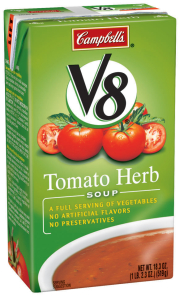More consumers cooking at home
‘No additives/preservatives’ is No. 1 label claim
Meat processor to use all-American hogs
Wow, your soup coulda been a V8
German spices in sleek jars

by Pan Demetrakakes
Executive Editor
Food manufacturers have an opportunity to appeal to children’s environmental consciences by marketing products and packaging that pay attention to environmental ethics, according to a new report.
Meanwhile, Nickelodeon, the children’s cable TV channel, is coming in for severe criticism from a leading consumer group that charges it has failed to live up to a pledge to stop marketing unhealthy food to children.
“Ethical and Wellness Food and Drinks for Kids,” a report from Business Insights, notes that children are expressing concerns over environmental issues more strongly and at a younger age than ever. It also noted that children have more pocket money and more influence in the purchase of family foods.
“There may be an opportunity for food and drink manufacturers to also target kids with health and ethical claims as they begin to become more aware of green issues and more concerned with status from a younger age,” the report states.
The report named environmentalism, quality and safety as three of the factors that parents considered most often when buying food for their children, and noted that parents are passing these concerns down to their children.
In another development relating to children and food, the Center for Science in the Public Interest (CSPI) is bashing Nickelodeon for failing to live up to an industry-wide initiative to limit the marketing of unhealthy food to children.
CSPI did an audit of food and beverage ads running on the children’s channel, which is owned by Viacom. Of the ads for food that had nutritional information available, 78% were for foods of poor nutritional quality, such as candy and sugary breakfast cereal. This compares to 88% in a 2005 audit. In Nickelodeon’s magazine, 77% of food ads were for candy, fast food and other nutritionally dubious products.
“There is literally no food, no matter how junky, that Nickelodeon won’t advertise on its airwaves or in its magazine or slap one of its characters on,” CSPI policy director Margo Wootan said in a statement. “Just relying on the food industry’s own initiative to improve practices has only made a small difference at Nick.”
In 2006, the Council of Better Business Bureaus convinced 10 major food companies to join a Children’s Food and Beverage Advertising Initiative in which companies pledge to shift their advertising and marketing to healthier foods. CSPI maintains that Nickelodeon’s subsequent performance shows the industry can’t be trusted to police itself.
A Nickelodeon spokesperson replied in a statement: “The CSPI release unfortunately misrepresents very important facts: 80% of the ads on Nickelodeon are not for food; all of our major food partners and advertisers have pledged to only market their better-for-you products to kids; and we've pledged that our licensed characters will only be used to promote healthy products beginning in 2009-and that just highlights some of our efforts over the past year on this issue.”
TOP DEVELOPMENTS
More consumers cooking at homeDue to the struggling economy, nearly 45% of Americans are eating out less this year-a nearly 12% increase from 2007-and cooking at home, according to a BIGResearch report. Sales of cookbooks, inexpensive cookware and basic foods have increased, and cooking magazines and websites have gained readership. Sales of supermarket “center store” goods, such as pasta, spices and canned and baking goods, have had a 3.4% sales increase in recent months, according to Thom Blischok, president of consulting and information at Information Resources Inc. An IRI survey found that nearly 30% of 1,000 consumers questioned are buying less fresh produce, and half are buying more generic brand products.
‘No additives/preservatives’ is No. 1 label claim
“No additives/preservatives” leads food product label claims in European and international launches, according to a Mintel report. The claim made up 23% of new product claims in Europe from January to September 2008, and 22% of claims on products launched globally. Out of the 49,752 new product launches around the world, 4,178 had the claim. The second, third and fourth most popular claims on new European products are “organic,” ”low/no/reduced fat” and “vegetarian,” respectively. These four make up nearly 62% of new European product claims.
Meat processor to use all-American hogs
Effective April 2009, labels on pork and packaged meats from processor/marketer Smithfield Foods will state that the products were made only from hogs born and raised in the U.S. Smithfield will label fresh pork according to country of origin labeling (COOL) guidelines for retail as born, raised and processed in the U.S. This contrasts with manufacturers such as Tyson Foods, some of whose products will use COOL labels that list more than one country as possible points of origin.

NEW PACKAGES
German spices in sleek jarSpices marketed in Germany and Austria are packaged in containers with a sleek, modern design and ease-of-use features. The spices from Kotányi Int’l, based in Wolkersdorf, Austria, are in ergonomically designed tapered-waist plastic jars fromGreiner Packaging. The closures have hinged flaps with indentations underneath to facilitate opening. The line is color-coded into four broad marketing categories: green for “fine herbs” like basil, yellow for “aromatic cuisine” like crushed cinnamon, red for “refined mixes” like fish spice salt and brown for “exquisite herbs."

Campbell Soup Co. has launched a brand extension of its V8 vegetable juice: single-strength soup packaged in aseptic cartons. V8 soups, based on pureed vegetables, are available in five flavors in 18.3-ounce aseptic multilayer cartons. The V8 line complements Campbell’s Select Gold Label line, launched in 2005, also in aseptic cartons.
